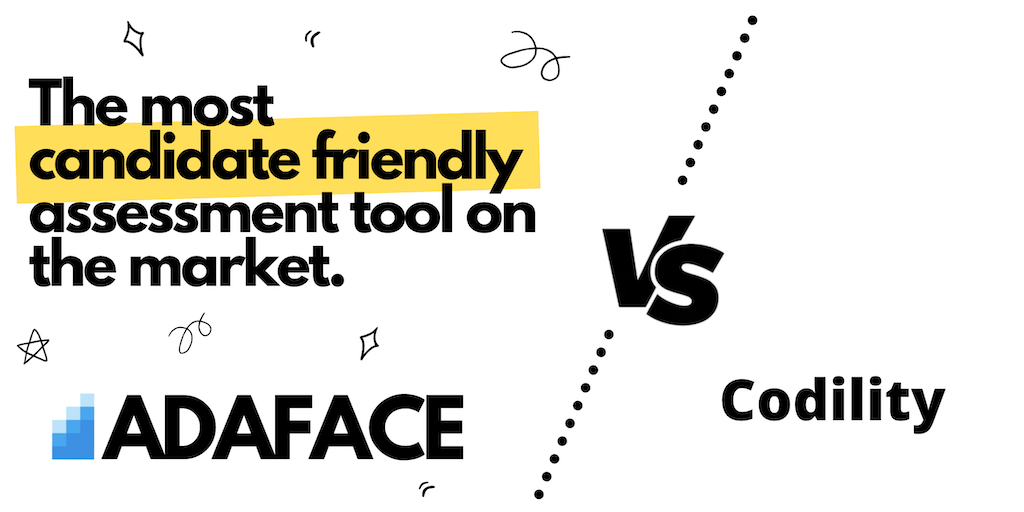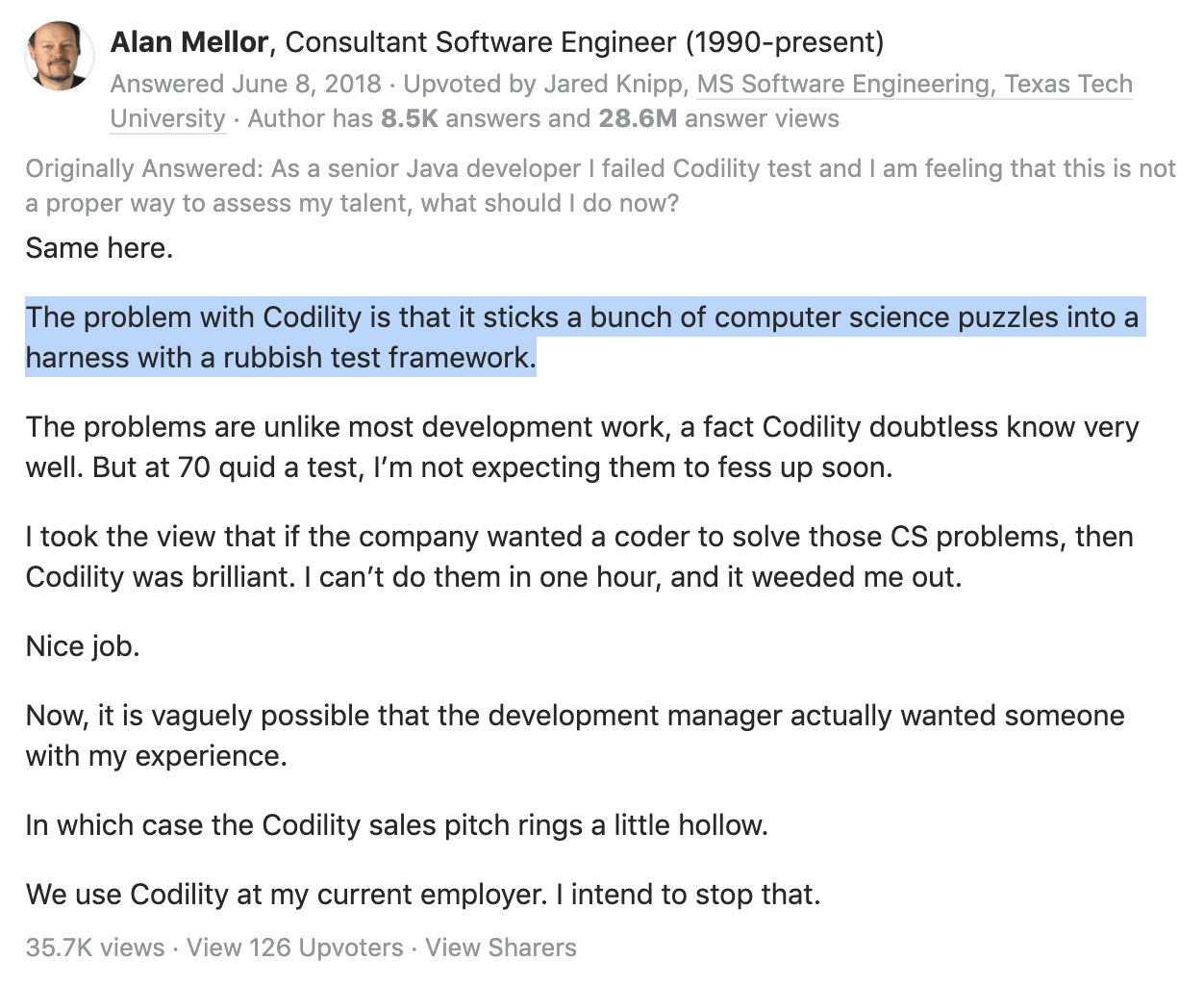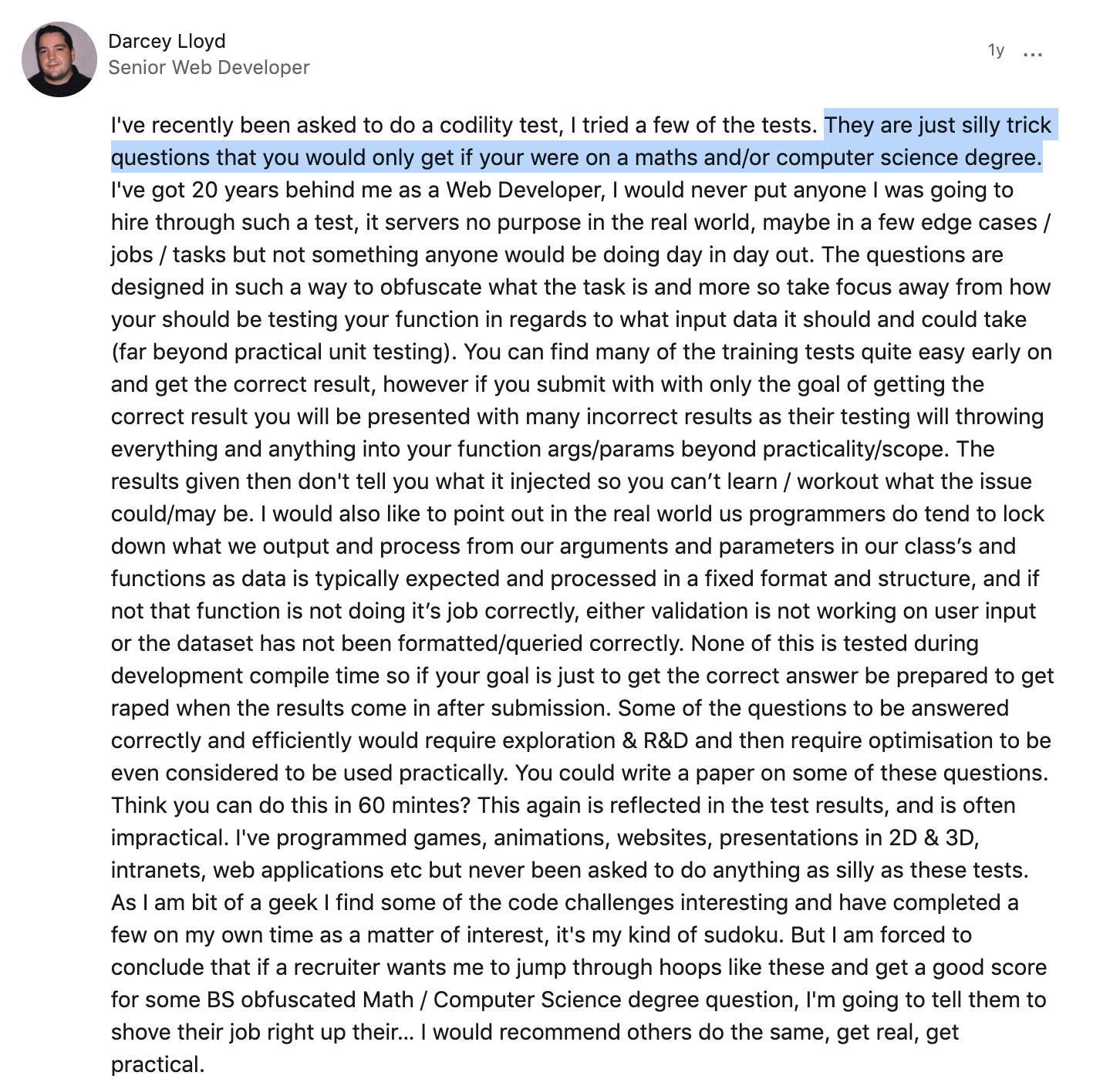Codility vs Adaface

Adaface vs Codility (Key Differences)
1. Question bank
Adaface
Adaface questions are designed to test for on-the-job skills, as opposed to theoretical knowledge. They are designed to simulate scenarios that the candidates might come across while performing the role, are hence the scores reflective of qualifications for the job. There are no trick questions included just to filter out candidates. Every candidate gets a fair chance to showcase their skills.
You can check Adaface sample questions.
Codility
Codility has a vast library of questions designed to test for data structures and algorithmic skill. This is seen to work really well for roles that require niche algorithm design skills. Another use case is to hire fresh computer science graduates.
2. Test taking rate
Adaface
Adaface conversational assessments have an average completion rate of 86%.
Codility
Traditional assessment platforms like Codility see a test taking rate of ~50%. In some geographies, this can be as low as 30%.
3. Breadth of skills covered
Codility
Codility is focused on testing for tech skills. Even within tech, their focus is on coding questions that test for algorithmic skill.
Adaface
Adaface covers a wide range of tech and non-tech roles. Within tech, Adaface covers junior and senior roles for software engineering, web development, data science, database skills, devops, cybersecurity, analytics etc. They also have assessments for non-tech skills like Excel, accounting, marketing etc.
How senior engineers feel about Codility
While Codility is a mature platform for algorithmic skills testing, often senior developers are frustrated at the focus on computer science puzzles/ trick questions when these tests are used for roles where algorithmic ability is irrelevant (e.g. web developer, front-end developer etc.)



Adaface vs Codility (Feature wise comparison)
Skills assessment
| Feature | Adaface | Codility |
|---|---|---|
| Coding tests | ||
| No. of programming languages supported | 32 | 32 |
| No. of IT skill tests | 700+ | 100+ |
| Aptitude assessments | - | |
| Non-IT tests (Excel, Accounting, Marketing) | - | |
| Adaptive assessments | - | |
| Custom assessments (built by experts) | - | |
| Premium questions | - |
Candidate friendly features
| Feature | Adaface | Codility |
|---|---|---|
| Candidate engagement | - | |
| Company FAQs | - | |
| Fully customizable email templates | ||
| Rejection emails | - |
Anti-plagiarism suite
| Feature | Adaface | Codility |
|---|---|---|
| Web proctoring | ||
| Video proctoring | ||
| Social listening for task leaks | ||
| Plagiarism detection |
Reporting and Analytics
| Feature | Adaface | Codility |
|---|---|---|
| Easy to share reports and scorecards | ||
| Exportable/ downloadable scorecards | ||
| Benchmarking of candidates | - | |
| Recruiting analytics |
Ease of use
| Feature | Adaface | Codility |
|---|---|---|
| Share public link to invite candidates | ||
| Cancel unused invites | ||
| ATS integrations | ||
| API integrations | ||
| Internationalization | ||
| Candidate pipeline management |
Enterprise friendly
| Feature | Adaface | Codility |
|---|---|---|
| White-labelling options | - | |
| Custom branding | - | |
| Chatbot support | - | |
| User, role and access management | ||
| Campus hiring support | - | |
| Dedicated account manager | ||
| EEOC compliant | ||
| GDPR compliant |
Background
Both Adaface and Codility are pre-employment screening software that allow companies to automate first round interviews. While some features are similar (like proctoring, social listening for questions leaking) they have major differences that one might consider while deciding which solution to choose.
What is Adaface?
Adaface helps you identify the top candidates for all your tech roles and save crucial engineering time by screening candidates with 750+ custom assessments for on-the-job skills (all programming languages, frameworks, aptitude). Top candidates prefer Adaface because our bot, Ada has a friendly chat involving relevant code challenges with them as opposed to asking trick questions on a test.
What is Codility?
Codility is a technical screening platform that companies can use to conduct online coding tests for first round screening. Candidates go through a coding test as part of the screening process and aim to solve coding challenges to prove their programming/ algorithmic ability.
